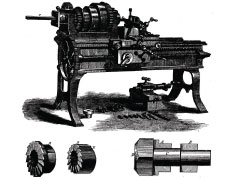It is believed the earliest metal work performed was discovered in Northern Iraq in the form of copper pendants. They are thought to be from around 8000 BC. A far cry from where we are today. With modern technology, parts can be 3d printed in Titanium to just about any shape the mind can imagine. In a very short period of time, we have gone from blacksmith to engineer.
The greatest technological advances have really come about in the last 150 years, and even though there are still blacksmiths plying their trade today, the modern engineer is responsible for the manufacturing, design, and repair of all the metal items we take for granted in our everyday life.

Most of the evolution of this work occurred during what is known as “The Machine Age” and is approximately dated from the early 1880’s to the mid 1940’s. This period, the successor to “The Industrial Revolution”, developed the basis for modern machining and fabrication equipment, and also the first true process and procedures for mass production.
With the development of the modern electrical grid, machinery was able to evolve. A steam engine that drove a central shaft down the middle of a workshop, from which belts were fed off to power individual machines, became obsolete. Individual machines could be powered by a plug. Something we take for granted today. Machines could consume more power, enabling them to be faster and more powerful than before.
In time computers would be developed and integrate with the machinery we use to craft metal components. The culmination of this technology paired with the readily available power in a modern workshop has led to truly remarkable equipment being developed for modern manufacturing. Computers are now built into most pieces of modern day workshop equipment and are used to complete a variety of tasks in machine operation.
From dual spindle, multi axis CNC lathes, to robotic welding machines and 3d Titanium Printers, the development of the technology we use today has indeed come a long way.